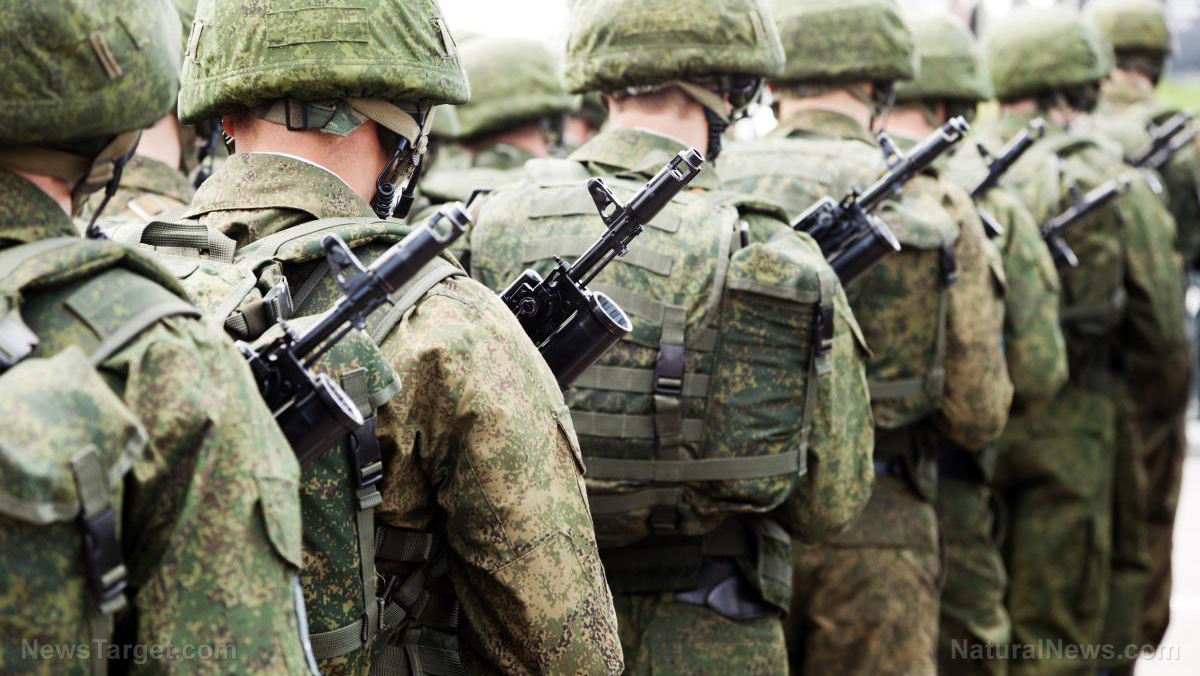US soldiers sue federal agencies over military’s COVID-19 vaccine requirements
09/09/2021 / By Divina Ramirez

Two active-duty staff sergeants of the United States Armed Forces filed a lawsuit against three federal agencies, challenging plans to require COVID-19 vaccinations among military troops, even those who have acquired natural immunity due to previous infection.
The lead plaintiffs, Army Staff Sergeant Dan Robert, a drill sergeant at Fort Bragg, North Carolina, and Marine Staff Sergeant Hollie Mulvihill, an air traffic controller at Marine Corps Air Station New River in Jacksonville, North Carolina, filed their lawsuit on Aug. 17 as Secretary of Defense Lloyd Austin announced that he would seek approval to mandate COVID-19 vaccination for active-duty service members beginning Wednesday, Sept. 15.
The lawsuit is lodged against the Department of Defense (DoD), the Department of Health and Human Services (HHS) and the Food and Drug Administration (FDA).
On Monday, Aug. 30, the plaintiffs asked U.S. District Court Judge Raymond Moore to grant a temporary restraining order to halt COVID-19 vaccinations for military troops while legal questions were being resolved. The plaintiffs had written that they will sustain “immediate physical harm” by being forced to take a vaccine for a virus, which they already have natural immunity against due to previous infection.
Moore denied the request two days later on Sept. 1, stating that the plaintiffs’ attorneys hadn’t presented a legal basis for the harm they seek to prevent. Nonetheless, the two’s lawsuit continues through standard court procedures. A trial date has not been set as of the time of this writing, according to court records.

DoD is following its own rules
Dale Saran, one of the plaintiff’s attorneys, told the Military Times on Friday, Sept. 3, that the DoD itself might not be abiding by its own rules. According to Saran, Army Regulation 40-562 presumptively exempts active-duty service members from any vaccination requirement if they’ve had a previous documented infection.
Saran also referenced a document from the U.S. Army Medical Command that was obtained by the Military Times on June 13. The document outlined authorized medical exemptions to vaccination requirements, including “evidence of immunity based on … documented infection” and similar circumstances.
Saran said the “immunity” mentioned in that document can be granted if a service member has already contracted COVID-19. “If you get the virus and survive it, that’s as good as it gets,” he added.
Furthermore, Robert and Mulvihill referenced in their lawsuit an Aug. 24 interview by Brett Giroir, who led the COVID-19 testing program during former President Donald Trump’s administration. In the interview, Giroir said that natural immunity is important and that there’s still no data to suggest that vaccine immunity is better than natural immunity.
Austin released a memo that same day, declaring that service members were considered fully vaccinated two weeks after completing the second dose of a two-dose COVID-19 vaccine or two weeks after receiving a single dose of a one-dose vaccine. Those who have been infected with COVID-19 previously are not considered fully vaccinated.
Lasting natural immunity is gained after recovery from COVID-19
The lawsuit also cited long-established precepts of virology demonstrating that immunity provided by recovery from an actual infection is at least as effective, if not more so, than any immunity conferred by a vaccine. (Related: Policymakers ignoring natural immunity to covid in favor of “vaccine” immunity.)
In fact, a recent study published in the journal Nature showed that after infection with the Wuhan coronavirus (SARS-CoV-2), most people seemed to have some protection against the virus for at least a year. Even those who have had mild infections enjoyed some protection against the virus.
The study, which was led by researchers from The Rockefeller University in New York City, also found that the participants’ antibodies against SARS-CoV-2 continued to evolve for up to a year following infection. Antibodies, which the body produces in response to infection, can linger in the blood plasma for several weeks. However, their levels significantly drop with time.
In addition, the researchers found that recovered participants who weren’t vaccinated still maintained most of their plasma antibodies against the virus’s receptor-binding domain (RBD). The RBD is a short fragment from a virus that binds to a specific receptor to gain entry into healthy host cells.
They also found that recovered participants’ memory B cells – immune cells formed following a primary infection – evolved to produce a broader and more potent range of antibodies against SARS-CoV-2.
Another study published in Nature suggests that people who have been infected with the virus will likely make antibodies against it for most of their lives.
The study, which was conducted by researchers from the Washington University School of Medicine in St. Louis, Missouri, showed that long-lived antibody-producing cells were present in the bone marrow of recovered COVID-19 patients.
The study provides evidence that immunity triggered by COVID-19 infection will be long-lasting.
Learn more about how the government is pushing for mandatory COVID-19 vaccinations at VaccineWars.com.
Sources include:
Tagged Under: big government, coronavirus, coronavirus vaccines, covid-19, health freedom, medical fascism, Medical Tyranny, military, natural immunity, pandemic, Resist, vaccine mandates, vaccine wars




















